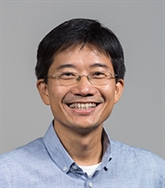-WE7506e93b81.png)
Non-invasive pre-natal testing by cell-free DNA screening
Algorithm, Cloud & Security
This workshop explores the application of computer science and bioinformatics techniques in non-invasive pre-natal testing (NIPT).
Cell-free DNA (cfDNA) screening is an emerging NIPT approach for identifying and detecting abnormalities in the genome of a fetus from a pregnant woman’s blood sample. It involves two steps. The first step is extracting and sequencing cell-free DNAs from a pregnant woman’s blood. Only a small fraction (circa 5%) of these cell-free DNAs are fetal DNAs. While a normal clinical genome is sequenced at 30x coverage, NIPT sequencing is done at 5x coverage for cost effectiveness. This translates to an ultra-low circa 0.1x coverage the fetal genome (i.e. 300x lower than that of a clinical genome). Moreover, sequencing reads this fetal genome is buried in over 20x noise from the maternal genome. The second step---which is also the theme of this workshop---infers the genomic information of the fetus by means of bioinformatics analysis, in face of the challenges of ultra-low coverage and high noise.
Learning objective: Students attending this workshop will be introduced to (i) DNA sequencing and read mapping, with an emphasis on computational methods and tools for read mapping; (ii) NIPT by cfDNA screening, with an emphasis on appreciating complications and noise in the ultra-low-covering sequencing data; and (iii) statistical modeling and analysis, which takes genetic features into consideration.
Cell-free DNA (cfDNA) screening is an emerging NIPT approach for identifying and detecting abnormalities in the genome of a fetus from a pregnant woman’s blood sample. It involves two steps. The first step is extracting and sequencing cell-free DNAs from a pregnant woman’s blood. Only a small fraction (circa 5%) of these cell-free DNAs are fetal DNAs. While a normal clinical genome is sequenced at 30x coverage, NIPT sequencing is done at 5x coverage for cost effectiveness. This translates to an ultra-low circa 0.1x coverage the fetal genome (i.e. 300x lower than that of a clinical genome). Moreover, sequencing reads this fetal genome is buried in over 20x noise from the maternal genome. The second step---which is also the theme of this workshop---infers the genomic information of the fetus by means of bioinformatics analysis, in face of the challenges of ultra-low coverage and high noise.
Learning objective: Students attending this workshop will be introduced to (i) DNA sequencing and read mapping, with an emphasis on computational methods and tools for read mapping; (ii) NIPT by cfDNA screening, with an emphasis on appreciating complications and noise in the ultra-low-covering sequencing data; and (iii) statistical modeling and analysis, which takes genetic features into consideration.

About Professor
Professor Wong Lim Soon
Department of Computer Science, School of Computing, NUS
Professor Wong Limsoon is Kwan-Im-Thong-Hood-Cho-Temple Professor in the School of Computing at the National University of Singapore (NUS). He was also a professor (now honorary) of pathology in the Yong Loo Lin School of Medicine at NUS.
He currently works mostly on knowledge discovery technologies and their application to biomedicine. Limsoon is a Fellow of the ACM, inducted in 2013 for his contributions to database theory and computational biology. His other awards in these two areas include the 2003 FEER Asian Innovation Gold Award for his work on treatment optimization of childhood leukemias, and the ICDT 2014 Test of Time Award for his work on naturally embedded query languages.
Department of Computer Science, School of Computing, NUS
Professor Wong Limsoon is Kwan-Im-Thong-Hood-Cho-Temple Professor in the School of Computing at the National University of Singapore (NUS). He was also a professor (now honorary) of pathology in the Yong Loo Lin School of Medicine at NUS.
He currently works mostly on knowledge discovery technologies and their application to biomedicine. Limsoon is a Fellow of the ACM, inducted in 2013 for his contributions to database theory and computational biology. His other awards in these two areas include the 2003 FEER Asian Innovation Gold Award for his work on treatment optimization of childhood leukemias, and the ICDT 2014 Test of Time Award for his work on naturally embedded query languages.


Professor Ken Sung
Department of Computer Science, School of Computing, NUS
Professor Sung Wing-Kin is a professor in the School of Computing at NUS, and he is a senior group leader in Genome Institute of Singapore. He has over 20 years’ experience in algorithm and bioinformatics research. He was conferred the 2003 FIT paper award (Japan), the 2006 National Science Award (Singapore), and the 2008 Young Researcher Award (NUS) for his research contribution in algorithm and bioinformatics.
Department of Computer Science, School of Computing, NUS
Professor Sung Wing-Kin is a professor in the School of Computing at NUS, and he is a senior group leader in Genome Institute of Singapore. He has over 20 years’ experience in algorithm and bioinformatics research. He was conferred the 2003 FIT paper award (Japan), the 2006 National Science Award (Singapore), and the 2008 Young Researcher Award (NUS) for his research contribution in algorithm and bioinformatics.

